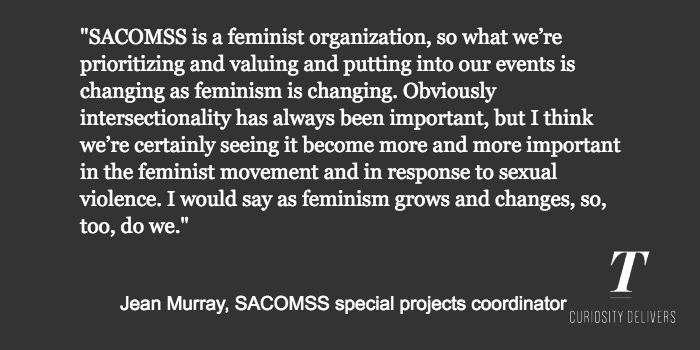Bringing awareness to sexual violence has traditionally proven to be a difficult task, but it is one that the Sexual Assault Centre of the McGill Students’ Society (SACOMSS) is once again ready to undertake.
For many years, the volunteer-run organization has been committed to supporting survivors of sexual assault through many initiatives, including the ongoing Sexual Assault Awareness Week. From March 29 to April 1, SACOMSS is hosting speakers, workshops, and information sessions aimed at raising awareness about issues revolving around sexual assault in the McGill context, as well as in surrounding communities.
Talia Gruber and Jean Murray, SACOMSS special projects coordinators, noted that the nature of sexual assault and gender-based violence can make it so that students feel uncomfortable expressing interest in learning more. Though SACOMSS has made a big push to table various events on campus and engage individuals through open libraries, essentially an informal question and answer period, Murray still claims visibility proves to be one of SACOMSS’ biggest challenges.
“It’s hard getting people to come to things, even if they are basic, intro-level, ‘let’s just talk about this, maybe you have some questions’ sort of things,” Murray explained.
Throughout the week, the organization hopes to offer support and visibility for those who may not be given space within mainstream sexual assault awareness organizations.
“Considering that the movement to end sexual violence—the mainstream movement—has been largely white, cis-gendered women, which is not at all the priority or should not be the priority of a mainstream sexual violence movement, I think that SACOMSS is trying at least to do a really good job of reflecting the real impact of sexual violence and who it affects,” Gruber said.
Included in this year’s Sexual Assault Awareness Week is a mix of casual events such as the aforementioned open library, as well as closed events aimed at specific populations who are disproportionately affected by sexual violence.
Widening the scope and trying to focus on the populations who are most directly affected by sexual violence, such as women of colour, is an important tenet of SACOMSS’ mission and part of the organization's aim to expand their events beyond ‘Sexual Assault 101’.
The Week closes with the annual Fire With Water show—an art exhibit and performance evening with the goal of allowing for artistic responses to sexual violence, gender-based violence, survivorship, and their intersecting themes.
In an interview with CTV Montreal, Karine Raynor, curator of the RBC Art and Heritage Centre at the McGill University Health Centre, noted that art can have a remedial function.
“Art has the potential to bring us into the present moment which we don't do a lot when we're ill or when we're with people that are very ill, because we're thinking about the future and we kind of get wrapped up in our thoughts,” Raynor stated.
The healing power of art for survivors of sexual assault is not lost on Gruber and Murray, who both acknowledged the importance of art as a curative outlet. As such, there is a workshop included in the schedule for the week titled “In Rhyme, In Time” that is geared towards writing poetry and spoken word as remedial tools.
Another idea Gruber and Murray, both involved with SACOMSS for four and five years respectively, acknowledged is the evolving nature of SACOMSS’ initiatives alongside the changing world of feminism.
“SACOMSS is a feminist organization, so what we’re prioritizing and valuing and putting into our events is changing as feminism is changing,” Murray explained. “Obviously intersectionality has always been important, but I think we’re certainly seeing it become more and more important in the feminist movement and in response to sexual violence. I would say as feminism grows and changes, so, too, do we.”
While the recent Jian Ghomeshi ruling is sure to provide a catalyst for the week’s events, Gruber and Murray both hope that the week gives survivors and allies the space and opportunity to do what they feel is important; to reflect the real impact of sexual violence and who it affects.
“I would like to demonstrate that this is still a relevant and ongoing conversation,” Murray said. “I think people get tired of the cycle of something happens, there’s outrage, people forget about it, people move on, then there’s another event, more outrage. I think people forget that this is something that is constantly affecting people and it’s […] insidious.”
Though both McGill as an institution and the wider societal contexts could do much more sexual assault advocacy, SACOMSS’ annual Sexual Assault Awareness Week is doing well to give communities disproportionately affected by sexual violence the funding and space to make a space for themselves—a mission certainly worth supporting.








